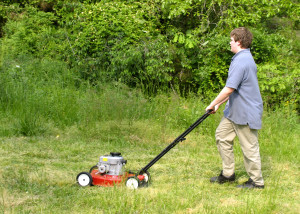It all begins with a simple premise: an hour is an hour. No matter who you are, what you do, or where you are, your time is valuable – just as valuable as everyone else’s.

Time banks are being created all over the world to facilite the equal trade of goods and services among community members. Say you need help clearing out your garden before spring planting. The task will take about two hours.
You call the time bank coordinator, who matches you with another bank member who is willing to help with yard work and your account is debited for two hours. A week later, you get a call from the coordinator.
Another bank member needs several freezer meals prepared before her baby is born. You agree to take on the project, and report the time you spend cooking to the bank coordinator, who credits your account. Most people feel uncomfortable asking a neighbor for a favor. Time banks alleviate this barrier by formalizing reciprocity. Both you and the person helping you know that the favor will be paid back one way or another.
Types of Services
What kind of help can you get from a time bank member? Rules vary by time bank, but in general you can ask for help with anything provided it is not illegal. Typical requests for help include:
- Childcare
- Transportation
- Yard work
- Household projects and repairs
- Professional services
- Lessons, tutoring, classes
How Do I Join a Time Bank?
The hardest part is finding a local time bank. If you live in a larger metropolitan area, chances are there is a time bank in your area. Time Banks USA maintains a directory of time banks in the U.S. Contact the coordinator, who will ask for some basic contact information, your availability to provide services to other members, and the types of work you are willing to do.
Share Your Experiences
Are you a member of a local time bank? Over the coming weeks we will be publishing interviews and profiles of successful time banks. Leave a comment if you would like to share your story or to nominate your time bank!










































I thought of the “Time Bank” post today, as I listened to my youngest son do his 2nd grade reading homework aloud. It was the story, “Pelle’s New Suit” by Elsa Beskow about a little boy who asks for help from the adults in his life to card the wool, spin the wool, weave the wool and sew the cloth into a suit. The boy shears and dyes the wool himself and does the work the adults ask of him in return for the work they are doing on his behalf. It was a beautiful story modeling the barter system. The only money spent was for the dye and he earned it by doing an errand for his grandfather and was told he could “keep the change”.
https://www.amazon.com/Pelles-New-Suit-Elsa-Beskow/dp/0863155847
The San Francisco Bay Area Community Exchange Time Bank ( https://timebank.sfbace.org/ ) is a pretty great example of a Time Bank that uses online infrastructure to make it scalable. I’m all for old-school versions as well, but I’d like to see who else is doing something similar.
There are at least 2 time banks near me. The one in Madison, WI has been running for years: https://www.danecountytimebank.org/
The one in Richland Center, WI is newer.
The things to be aware of initially are that they require manpower for all the coordination. It’s a hefty task to take on for volunteers. So start up $ to pay staff would be ideal.
In Madison I heard there was some conflict as to hours being equal ie. an hour of a lawyer’s time equal to an hour weeding a garden.
So every community might work things out their own way. But these two time banks are still going strong. Hopefully these will catch on more and more.